|
|
|
Sort Order |
|
|
|
Items / Page
|
|
|
|
|
|
|
| Srl | Item |
| 1 |
ID:
159256
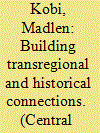

|
|
|
|
|
| Summary/Abstract |
Economic investment and the growing immigration of Han Chinese from other parts of China to the Xinjiang Uyghur Autonomous Region over the last three decades have increased the presence of eastern Chinese architecture in the urban built environment. This paper refers to the making of, residing in and speaking about the materiality of urban architecture by Turkic-speaking Muslim Uyghur middle-class actors. Besides creating personal comfort through Uyghur elements they draw ethnic boundaries to the Han Chinese. In highlighting the materiality of architecture, the analysis expands beyond the individual house by investigating the ways in which urban architecture offers spaces of meaning for social and ethnic communities. Based on ethnographic data, this paper argues that due to the political context and the state-controlled urban development with Chinese characteristics, urban Uyghur architecture was relegated from the outside of houses to an emphasis on interior decoration.
|
|
|
|
|
|
|
|
|
|
|
|
|
|
|
|
| 2 |
ID:
169227
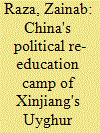

|
|
|
|
|
| Summary/Abstract |
Recently, reports have emerged that China operates “political re-education” camps of Uyghur Muslims in Xinjiang. China justified them as a sort of vocational training program to assist Uyghurs in participating in the Chinese economy. In actuality, they are brutal incarceration camps; these forms of ‘education’ can qualify as torture that perhaps 1.5 million adults have been subjected to, and have led to detaining children of people incarcerated in state-run boarding schools. It is necessary to interrogate the underlying factors that have enabled the Chinese government to open and operate these camps under the guise of education. This paper first examines the impact of the current geopolitical interests of China's Belt & Road Initiative and the historical backgrounds of Xinjiang and the Re-Education through Labour program. It then explains the methods of ‘education’ taking place within the camps and interrogates China's justifications for building them. This education issue is more about inhibiting Uyghur power than China's claim that the camps are meant to empower Uyghurs to participate in the Chinese labour force.
|
|
|
|
|
|
|
|
|
|
|
|
|
|
|
|
| 3 |
ID:
105179


|
|
|
|
|
| Publication |
2011.
|
| Summary/Abstract |
In September 2009, the Information Office of the State Council of the People's Republic of China claimed that Xinjiang benefits from respect and harmony between the ethnic groups. This rhetoric is faithfully propagated by national media: they uniformly praise the unity amongst the Han and Uyghurs through the common slogans of minzu tuanjie (ethnic unity ) and hexie guanxi (harmonious relations). Going beyond the official documents and propaganda, my purpose is to explore the relations between these two ethnic groups. I will focus on the ideas, words and actions of Han and Uyghur young people living in Urumqi who are often under-represented in official sources, or other forms of written and scholarly discourse. While comparing their behaviour, I argue that ethnic disharmony between Hans and Uyghurs exists, but it is simplistic to blame only the Chinese government or one of the ethnic groups, and naïve to ask what China can do to solve the problem. Instead, by exploring what the social agents in the young educated society in Xinjiang truly think of ethnic relations between them and the "other," this paper presents a comprehensive picture of the issue. My ethnographic research interprets how people remember, interpret and sometimes exaggerate their ethnic traditions and cultural practices in daily life in relation to the other ethnic group. The findings demonstrate how young people are determining the course of ethnic relations by constructing movable social barriers that result in segregation between them, raising doubts about the future possibilities for ethnic harmony.
|
|
|
|
|
|
|
|
|
|
|
|
|
|
|
|
| 4 |
ID:
152311
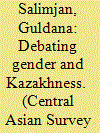

|
|
|
|
|
| Summary/Abstract |
Aytis is a central component of Kazakh oral literature. It is a duelling performance of improvised oral poetry between two aqins (poets, or bards) accompanying themselves on the dombra, a two-stringed plucked instrument. This article analyses contending issues in a transnational aytis between Chinese and Kazakhstani aqins, and explores how gender plays into the complex interplay of transnational identity politics, nationalism, performer positionality, and the preservation of intangible cultural heritage. This article argues that, though minority actors are subject to state-patronized national projects and the gender paradigms those projects entail, they can also obtain empowerment from performing tradition as a way to legitimize their status as culture producers and flexible citizens. Situated as the guardians of a constructed gender balance in society, women performers of oral tradition occasionally find themselves with opportunities to transgress the boundaries of their national and gender norms.
|
|
|
|
|
|
|
|
|
|
|
|
|
|
|
|
| 5 |
ID:
164691
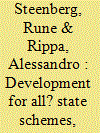

|
|
|
|
|
| Summary/Abstract |
The past decade of development schemes has been experienced very differently by various groups within the city of Kashgar in the Xinjiang Uyghur Autonomous Region of China. The recent exacerbation of social inequalities, stratification, and tensions in Kashgar is a structural consequence of two phases of government policies: an accelerated formalization of the economy and remodelling of the city-scape as part of modernistic development implemented before 2014, followed by a phase of strong securitization. Based on long-term ethnographic fieldwork between 2009 and 2017, this paper analyzes the situation, reactions, and strategies of different groups of Uyghur residents of Kashgar to cope with the changing socio-economic and political environment.
|
|
|
|
|
|
|
|
|
|
|
|
|
|
|
|
| 6 |
ID:
182829


|
|
|
|
|
| Summary/Abstract |
The article explores the political and diplomatic response from Kazakh and Kyrgyz governments towards China regarding its post-2014 Xinjiang security strategy. The policy, which includes repressive measures against Xinjiang Muslim minorities, has led to the detention of a significant number of ethnic Kazakh and Kyrgyz, thus calling for a reaction from their kin states. In order to explain the complexity of the problem, the article looks via a neorealist lens at the role of Kazakh and Kyrgyz human rights advocacy groups in urging local authorities to securely release ethnic Kazakh and Kyrgyz detained in Xinjiang's “vocational camps”. It further explores official responses from Kazakh and Kyrgyz governments, identifying their considerations and foreign policy choices. This article concludes that Kazakh and Kyrgyz governments neither possess economic and political leverage to press on China over the Xinjiang issue nor are they willing to do so as this may jeopardize their cooperation with China.
|
|
|
|
|
|
|
|
|
|
|
|
|
|
|
|
| 7 |
ID:
164489
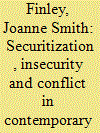

|
|
|
|
|
| Summary/Abstract |
In the Introduction to this special issue, I first provide an overview of the programme of 'de-extremification' and mass internment in Xinjiang since early 2017. I then situate this development against the ‘ideological turn’ in Chinese Communist Party policy under President Xi Jinping, highlighting the new emphasis on stability maintenance and ideational governance. Next, I explore experiences of (in)security in Uyghur communities in- and outside of Xinjiang in the era of internment to consider how far PRC counter-terrorism initiatives have now evolved into state terror. In doing so, I apply Ruth Blakeley's (2012) definition of state terror as a deliberate act of violence against civilians, or threat of violence where a climate of fear is already established by earlier acts of violence; as perpetrated by actors on behalf of or in conjunction with the state; as intended to induce extreme fear in target observers who identify with the victim; and as forcing the target audience to consider changing its behaviour. Finally, I discuss the six contributions to the special issue.
|
|
|
|
|
|
|
|
|
|
|
|
|
|
|
|
| 8 |
ID:
164494


|
|
|
|
|
| Summary/Abstract |
Since spring 2017, the Xinjiang Uyghur Autonomous Region in China has witnessed the emergence of an unprecedented re-education campaign. According to media and informant reports, untold thousands of Uyghurs and other Muslims have been and are being detained in clandestine political re-education facilities, with major implications for society, local economies and ethnic relations. Considering that the Chinese state is currently denying the very existence of these facilities, this paper investigates publicly available evidence from official sources, including government websites, media reports and other Chinese internet sources. First, it briefly charts the history and present context of political re-education. Second, it looks at the recent evolution of re-education in Xinjiang in the context of ‘de-extremification’ work. Finally, it evaluates detailed empirical evidence pertaining to the present re-education drive. With Xinjiang as the ‘core hub’ of the Belt and Road Initiative, Beijing appears determined to pursue a definitive solution to the Uyghur question.
|
|
|
|
|
|
|
|
|
|
|
|
|
|
|
|
| 9 |
ID:
183185


|
|
|
|
|
| Summary/Abstract |
The year 2020 marked a change in Kazakhstan's approach to Kazakh asylum seekers from China. For the first time, ethnic Kazakhs escaping China's security and ethnic policy apparatus in Xinjiang Uyghur Autonomous Region (XUAR; Xinjiang) were granted a right to a temporary stay in the country. The status was valid for one year only, yet it was a significant improvement as until 2020 similar cases were lost in Kazakh courts. This change was possible due to the international advocacy of local Kazakh human rights activists, the growing international recognition of the Xinjiang issue by the West, and the ambitions of Kassym-Jomart Tokayev, who has been developing his own style of the presidency with social issues as its centrepiece.
|
|
|
|
|
|
|
|
|
|
|
|
|
|
|
|
| 10 |
ID:
164491
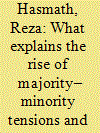

|
|
|
|
|
| Summary/Abstract |
In the past few years there has been a rise of inter-ethnic violence in China. While ethno-cultural repression and ineffective state policies are correctly attributed as key culprits behind this reality, this article suggests that socio-economic factors play a fundamental contributory role as well. Using the Xinjiang case, the article maps ethnic tensions and violence as a manifestation and expression of a growing and heightened ethno-cultural consciousness stemming from ethnic minorities’ low socio-economic status due, in part, to internal Han migration, and a labour market process – involving agency and structure – that has shaped a split and segmented labour market.
|
|
|
|
|
|
|
|
|
|
|
|
|
|
|
|
|
|
|
|
|